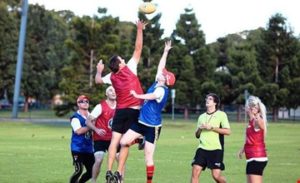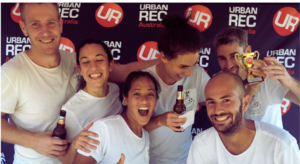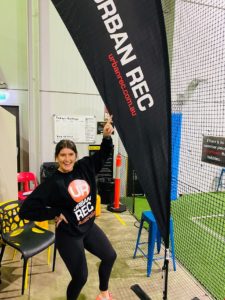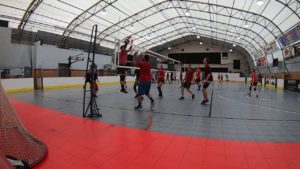My son calls me on the phone: “Dad ya gotta help me… my team has only got four players for Urban Rec tonight. Can you play?”
My son is twenty-three and I am ancient. He really must be desperate.
Me: “Ah… what is Urban Rec… and why would you ask me?”
My son: “I am asking you because I have asked everyone else, and no-one is available. A group of friends and I play Multi-Sports on Wednesday night and we really love it… and we really don’t want to miss a game. Everyone I know has either covid or a cold and we can’t put a team together. Will you do it? You’re my last chance!”
Me: “Thanks a million. Yeah… alright. But what is multi-Sport?”
My son: “Its freaking great. We play a different sport every week and tonight it’s European Handball. It’s a blast. You won’t regret it.”
Me: “I don’t even know what European Handball is… let alone ever played it. How could I be any help?”

My son: “Dad… that’s precisely the point. None of us can play it well. You will just learn as you go. Like the rest of us. But hurry. Game starts in an hour. Do you have a pink t-shirt?”
So, I found myself racing across town, heading to some outdoor sports centre at Camperdown, to play European Handball, with my son and a bunch of other mid-twenties people. I was about to become a ring-in for an Urban Rec team and I didn’t even know what that was.
I arrived just in time to find my pink-clad team assembling (along with a white-clad team, a black-clad team, and, oddly enough, another pink clad team – geez I hope we aren’t playing the other team in pink) before a well-dressed young woman in fancy sporty attire who, presumably, was about to tell us what was about to happen. She briefly described the rules of the game and, also, explained that while, technically, it was legal in European Handball to play defense by shifting your body to prevent the progress of your opponent, that that was “not the way we do things at Urban Rec.” She, politely, pointed out that aggressive, body-on-body, defense was discouraged. She let us know that it would be preferable for combatants to NOT dive in the path of each other. That was a bit of a shock to me. As someone who has had a competitive streak a mile wide for all my life, being told to play a game, but don’t play hard defense, seemed odd.
What on Earth is European Handball???
After the briefing, we were ushered through a gate onto the nearby playing fields. Several outdoor courts (netball courts in another life) had been converted into European Handball pitches with the help of four futsal goals and our game with the other team in pink (surely that was going to be a problem) was started with the blow of a whistle and the turning on of some cheerful music. Our team of three women and two men (one incredibly old) sprung into life!

I won’t lie. We had a ball. European Handball is a complete blast. Getting together and throwing a ball around in a none-to-serious way, under the stars, with a bunch of friendly people, has gotta be one of the best things you can do mid-week. And to think I could have been sitting on a couch watching television! We got smashed… but who cares. We had so much fun. The joy of being part of a team and experiencing the pleasure of helping your team score goals… even if you scored less goals than the other lot… is a supreme pleasure.
Yup. It was fun alright. Fun even despite the attention of the super-fast and athletic woman who kept jumping in my way and waving her hands in my face. Hang on. Didn’t this woman attend the briefing? I thought playing serious hard-core defense was against the spirit of this comp. Oh well. Who cares? We are still having fun!
Forty minutes later the game was over, and my team-mates and I decided to head off to a pub in Newtown to discuss our exceptional performance. As we left, the “host” (the fit looking woman in the smart sports outfit), approached us to discuss “fun points.”
What the hell are “fun points,” I thought.
“I think we should only give them a two or a three,” said one teammate.
“Aw… come on. We always give five. I don’t want to mark them down,” said another.
“Nah. Bugger that. Geez, mate. They were playing the game to a different set of rules to us. We had fun… but that wasn’t fair. I say we give ‘em two!” said another.
My daughter, (who was the team’s second ring-in on the night), as gentle a soul as you would ever want to meet, chipped in with, “I started playing softly but I was sick of it, so I ended up playing aggressively against that girl. I think they should be marked down!”
The negative views held sway but a compromise score of three “fun points” was awarded by our team to our opponents. Down two from the normal five was agreed to be “punishment” enough.
Man, this is a weird competition. Competition points for winning games… and “fun points” for being a fun team to play against. I wonder what score the other team gave us.

I found the Urban Rec concept so interesting that I phoned the organization to see if anyone would have a chat with me about what they do. The Australian founder, Madeleine Wilkie, stuck up her hand for a chat. Over a coffee in a café near the Urban Rec Marrickville headquarters, Madeleine answered a bunch of my questions. Here is what she told me.
Birth of Urban Rec Australia
Madeleine was raised by, first her Mum, then her dad, and as luck would have it, neither were all that fond of sport so being part of a team was not encouraged when she was growing up. Her thinking about sport shifted dramatically when she was living in Canada with her boyfriend, of the time. In Vancouver she discovered that while she truly hated exercise, she loved running around a field chasing a ball. Madeleine and her friend had joined an Urban Rec soccer team to extend their circle of friends in a new city and Madeleine discovered, to her surprise, that she actually loved sport even though she showed no particular talent for it. Madeleine was the perfect Urban Rec customer… i.e. she was an individual with zero experience or skills (who would never play sport for a specialist netball or soccer club or association because that experience would be altogether too intimidating and competitive) but someone who fell in love with the model of playing forty minutes of not-too-serious fun sport with friendly people and terrific team mates who were always up for a beer afterwards to relive the high and low points of the match that had just concluded.
Madeleine explained that these types of social sporting organizations were quite common in North America, and she was shocked that nothing quite like it existed in her home city of Sydney in Australia. Of course, Sydney is full of Rugby, Netball, Australian Rules, and Soccer clubs where serious athletes not only want to win but are more than willing to try to “kill each other” as part of the fun. But that is not the Urban Rec way! On her return to the land of kangaroos and meat pies she was determined to make sure that this brand of less competitive social sport was available to all those people who were either not much good at sport (but still wanted to play) or were talented but had grown out of the need to play it at a competitive level. Madeleine decided to bring Urban Rec to Australia and to convert her fellow sports lovers to the idea that sport should be primarily fun!

The early days
Getting a social sport company off the ground was tough. Try getting a local council that manages playing fields to give you permission to use a sport field in Sydney. According to Madeleine the response is always “no, no, no and no!” Existing sporting clubs protect their playing spaces like their very existences depend on it. Rugby, Rugby League, and Soccer clubs fully book their playing fields for every day of the week whether they are needed on those days or not! If a “no” answer ever changes to a “maybe” you can be sure that the field on offer will be the worst field, in the worst part of town on the worst day of the week. After calling and calling various field providers and begging for access to a place to play sport she was finally offered an area at the back of a Glebe dog park to commence her first competition.
The next problem faced by the unestablished Urban Rec was having players to play with. Madeleine threw together a flyer that announced that her company was going to be running five different social sporting competitions In Sydney’s inner west. Dodgeball, volleyball, netball, touch footy etc… all played with a set of rules to make the games as much fun as possible. Next, she bought a bunch of balls from a sports store and gathered all her mates together for a photo shoot at their new “sports ground.” After her early attempts at spreading the word (and not being overrun with customers) she made a special request to all her mates. “It is your job, if you love me, to find six friends and bring me a team.” Rather than starting with five competitions for five different sports Urban Rec finally kicked off with a single six team touch football competition. It was a start. Five of the teams were created by Madeleine’s friends but one team was a group of strangers. A first success! This competition was offered completely for free. The objective of “Competition One” was to prove that the Urban Rec business model could actually work.
Of course, Urban Rec was not important enough for the local council to organize field markings for the fledgling competition, so Madeleine laid out cones and ropes as sidelines and endlines. She had never played a game of touch footy in her life so, with the help of “a random she found on Gumtree” to host and referee the first fixture, Urban Rec, through months of persistence and determined effort, came into the world.
Big Differences
The big difference between Urban Rec and traditional sports is the emphasis on fun which came directly out of the Canadian model that Madeleine had experienced and loved so much. She explained that before the very first game she gathered all the teams together and made a point of explaining that they were there to have a good time and, as a result, Urban Rec would be doing things differently to regular sporting competitions. “Though most of them were my friends I treated them like they were perfect customers – so they got the experience of having a welcome intro with me – an explanation of the ethos of Urban Rec and an explanation of what “fun points” were and how they worked.” Madeleine explained that the “fun points” competition “reverse engineers” people’s natural desire to be competitive. She says its fun to stand around and listen to people in teams say to their team-mates “hey – don’t do that… we’ll lose fun points if we do that!”

The ”fun points” competition is a simple concept. “Your opposition score you out of five based on how fun you were to play against. The numbers are kept secret and get calculated at our back end. The team with the highest “fun points” ranking wins a prize. So, effectively, there are two competitions running at once. The champion team and the “fun points” winners. Back at the office we talk about the “fun points” competition being the more important because they are the ones more aligned with our brand and there for the right reasons.” Madeleine is unapologetic that “fun points” winners usually get a better prize than the competition champions.
While Urban Rec rules for each sport (after ten years of growth there are now competitions for multiple sports across multiple locations in Sydney and NSW) are not significantly different to the original sports they are based on but there are certain unwritten rules as to how games should be played. Specific rules that are changed are the insistence that a minimum of two women must be on court (per team) at any time for most sports. Additionally, in some sports, goals or tries scored by women are awarded greater points to ensure that the rare bloke who is not particularly sympathetic to the principle that all teammates should be involved in the action is encouraged to share the ball with his female teammates. Madeleine says that there are plenty of leagues available for blokes who only want to play with other blokes but that is not Urban Rec’s way.
Most unwritten rules about how an Urban Rec game is played revolve around defense. Madeleine makes the point that in games like netball and basketball defense is usually deliberately face-to-face and intense… one gets their body in the way of their opponent in possession of the ball and uses their body to stop their opponent’s progress or shot for goal. That kind of defense is discouraged in Urban Rec matches. Defenders are encouraged to stand back a little and to avoid intimidating behavior at all costs!
Early teething problems
The Urban Rec concept was clearly a goer from the very beginning (the customers loved it) but the problem was how to get the word out that a brand-new social activity was available right there in the city that was so cool that it had to be tried. As Madeleine explained, Urban Rec was not like some retail shop or café where you could have one or two bad days but still survive when the customers started flooding in again. At Urban Rec you needed to convince dozens of people per competition that you had an amazing product and service (that will make their week) and then have a critical mass of people turn up with a thousand dollars per team or one hundred and fifty dollars per individual at a specific time and if the people and money don’t come in, nothing went ahead. Scary.
When it came to marketing Madeleine became very hung up on believing that she did not know what she was doing. She was wrong. As she says now, “at the end of the day all you have to do is do a good job and the word trickles out.” In the days before Facebook and Instagram it was word of mouth advertising that enabled Urban Rec to grow from one touch footy competition to dozens of competitions (Soccer, Basketball, Netball, American Football, Multi-Sports, Dodgeball, Softball, Volleyball and Hockey) in multiple locations over a period of ten years. And its still growing. The Urban Rec team is adding more sports and more locations all the time.
 Super Inclusive
Super Inclusive
Madeleine says that making sport accessible and inclusive is central to their purpose at Urban Rec. She talks about the high school kids who secretly loved and wanted to play sport but could never make the rugby team or be part of the netball squad so lost out in this important part of their younger lives. Urban Rec strives to make sport accessible and available to every budding athlete who was never meant for “the big time” and never had the opportunity to develop any expertise but still wanted to experience the great things that sport can offer. “Dodgeball” and “European Handball” have become very important sports in the Urban Rec world because they are sports that very few Australians have much experience at. Madeleine explains that these sports are “gateway” sports in that every player enters a game with a pretty similar level of expertise so athletic rookies have the opportunity to shine just as much as seasoned athletes do. The “gateway” sports provide a level playing field which fits in perfectly with the inclusiveness philosophy that drives Urban Rec.
The Multi-Sport option is also fantastic for encouraging people who might not normally play sport. Despite the fact that Multi-Sport competitions are devilishly difficult to organize and administer in comparison to say a soccer competition the changing of sports every week over a ten-week season means that no one in any team can shine as the athletic master. Some teams may have a good soccer player, basketballer, or touch footy player, and these individuals may get their opportunity to play coach or mentor for a week, but over the full season things are evened out. The kinds of people who are attracted to Multi-Sports are just the kinds of people that Urban Rec has been created for!
If you are the kind of person who once loved playing sport but, at some point, decided that club sport was just a bit to competitive so you gave the thing away, Urban Rec sport may just be what you are looking for. Alternatively, you might be the kind of person who was never encouraged to play a team sport when you were young so you missed out on all the wonderful things that being part of a sports team can provide then, again, Urban Rec might be just what you are looking for. Maybe you are the kind of person who can’t stand exercise but the thought of running around a field with some mates chasing a ball actually sounds like fun then Urban Rec might be a thing for you too. If a mid-week social activity with lots of running around playing games, lots of laughs and lots of companionship sounds better than sitting on the couch watching tele or playing video games then think about giving Urban Rec a try. Even if you don’t end up the team’s number one scorer you will still be a welcome and valued participant who will have plenty to say when you gather for a beer and a post-game analysis at the pub afterwards!
Leave a Reply